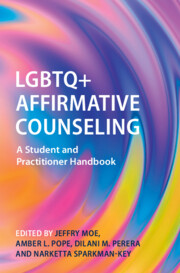Book contents
- LGBTQ+ Affirmative Counseling
- LGBTQ+ Affirmative Counseling
- Copyright page
- Contents
- Figure
- Tables
- Box
- Contributors
- Part I Foundations of LGBTQ+ Affirmative Counseling
- Part II LGBTQ+ Lifespan Development and Family Dynamics
- Part III Assessment and Treatment in LGBTQ+ Affirmative Counseling
- Part IV New Directions in LGBTQ+ Affirmative Counseling
- 14 Technology, Social Media, and LGBTQ+ Mental Health
- 15 International Perspectives on Gender, Sexual, and Affectional Diversity
- 16 Training and Supervision for LGBTQ+ Affirmative Practice
- Index
- References
16 - Training and Supervision for LGBTQ+ Affirmative Practice
from Part IV - New Directions in LGBTQ+ Affirmative Counseling
Published online by Cambridge University Press: 31 October 2024
- LGBTQ+ Affirmative Counseling
- LGBTQ+ Affirmative Counseling
- Copyright page
- Contents
- Figure
- Tables
- Box
- Contributors
- Part I Foundations of LGBTQ+ Affirmative Counseling
- Part II LGBTQ+ Lifespan Development and Family Dynamics
- Part III Assessment and Treatment in LGBTQ+ Affirmative Counseling
- Part IV New Directions in LGBTQ+ Affirmative Counseling
- 14 Technology, Social Media, and LGBTQ+ Mental Health
- 15 International Perspectives on Gender, Sexual, and Affectional Diversity
- 16 Training and Supervision for LGBTQ+ Affirmative Practice
- Index
- References
Summary
Although LGBTQ+ affirmative counseling is promoted through mental health professional guidelines, standards for training counselors in affirmative practice remain inconsistent and underdeveloped. In this chapter, we propose an adaptive strategies model for LGBTQ+ responsive counselor training and supervision, along with practice guidelines for educators that are grounded in professional standards, current research, and allyship development. Additionally, we review common training challenges and best practices to support LGBTQ+ trainees and promote allyship behaviors among all trainees.
- Type
- Chapter
- Information
- LGBTQ+ Affirmative CounselingA Student and Practitioner Handbook, pp. 294 - 308Publisher: Cambridge University PressPrint publication year: 2024

